An estimated 4 billion people worldwide were predicted to watch the funeral of Queen Elizabeth II on television and online, with Presidents Joe Biden of the U.S. and Emmanuel Macron of France and Canadian Prime Minister Justin Trudeau attending the obsequies in London’s Westminster Abbey in person. The medieval abbey, the sublime music and military processions were all a visual and aural feast, but the event was at its heart a Christian ceremony, with the coffin placed in front of the altar and presided over by robed clergymen.
The queen’s funeral, in this sense, was not entirely representative of Britain’s increasingly secular population. Even its believers are less likely to be Christian than at the start of Elizabeth’s reign, with 2.7 million Muslims, 800,000 Hindus and a half-million Sikhs, among many other faiths. Christians, who once consisted mostly of various Protestants — chiefly members of the Church of England, the Church of Scotland and the Church in Wales — and Roman Catholics, have been joined by a growing Pentecostal movement and other evangelical churches, according to the BBC.
There is nothing like a royal wedding or funeral to remind us that the Church of England remains the official, established church, with the monarch as its Supreme Governor, and since Elizabeth’s death on Sept. 8, we’ve seen it in the ascendant. Yet there are also signs that the late monarch, now-King Charles III and the Church of England have recognized that the time has come to adjust.
In a landmark speech in 2012 at Lambeth Palace, the London home of the Archbishop of Canterbury, the queen said of the Church of England that “Its role is not to defend Anglicanism to the exclusion of other religions. Instead, the Church has a duty to protect the free practice of all faiths in this country.”
She credited the established church with having done so already. “Gently and assuredly, the Church of England has created an environment for other faith communities and indeed people of no faith to live freely,” she said.
Your tax-deductible gift helps our journalists report the truth and hold Christian leaders and organizations accountable. Give a gift of $30 or more to The Roys Report this month, and you will receive a copy of “Hurt and Healed by the Church” by Ryan George. To donate, click here.
The new king has endorsed those words as recently as Sept. 9, the night after his mother died, in his first televised address to the British nation as its king. “The role and the duties of Monarchy also remain,” he said, “as does the Sovereign’s particular relationship and responsibility towards the Church of England — the Church in which my own faith is so deeply rooted.”
But he continued, ”In the course of the last 70 years we have seen our society become one of many cultures and many faiths.”
Nearly 30 years ago, as prince of Wales, Charles articulated concern about other faiths and Christian denominations in modern Britain not feeling included, and controversially suggested that when he became king he should be called Defender of Faiths — plural— rather than the title Defender of the Faith bestowed on Henry VIII by the pope in 1521 and used by England’s monarchs since.
Anglicans reacted harshly to Charles’ gambit, fearing he would not be fully wedded to assuming his role of Supreme Governor of the Church of England when the time came. Even after he rescinded his statement in 2014, the moment haunted Charles. His statement on Sept. 9 came in part to reassure doubters, who then heard him proclaimed king and Defender of the Faith the next day before the Accession Council, who proclaimed him the new monarch.
Then, bit by bit, we saw more evidence of how the king and his advisers, as well as the late queen, through her funeral plans, tried to embrace other traditions.
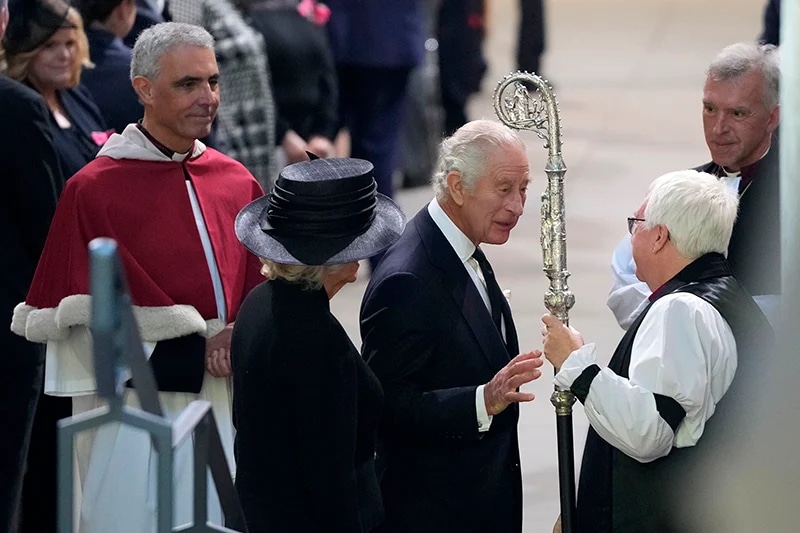
The Sept. 12 service of thanksgiving for the queen’s life was held at Edinburgh’s St Giles Cathedral, the main church of the Church of Scotland. Representatives of other faiths were in attendance, and the Gospel was read by Mark Strange, primus of the Scottish Episcopal Church, the other main Protestant church in Scotland besides the Church of Scotland.
More surprising, a passage from Paul’s Letter to the Romans was read by Leo Cushley, the Catholic archbishop of St. Andrews and Edinburgh, and included lines often interpreted as encouraging ecumenical dialogue: “We know that all things work together for good for those who love God, who are called according to his purpose.”
When Charles then paid a visit to Northern Ireland, more efforts were made to include the Catholic population, for whom the monarchy has long been a sensitive issue. At St. Anne’s Cathedral in Belfast — where the president of Ireland, Michael Higgins, and Taoiseach (as Ireland calls its prime minister) Micheál Martin were in attendance — Eamon Martin, the Catholic archbishop of Armagh and Primate of All Ireland, offered a prayer; others were said by Methodist and Presbyterian church leaders. At a service during Charles’ stop in Wales, prayers were said by Muslim and Jewish representatives as well as representatives of several Christian denominations.
But a reception at Buckingham Palace for 30 faith leaders on Friday — before the new king met any world leaders in London for the funeral, and even before he took part in a vigil with his siblings at the lying-in-state of his mother — spoke volumes about the importance Charles assigns religion in Britain.
Charles welcomed not only the Catholic archbishop of Westminster but Bishop Kenneth Nowakowski of the Ukrainian Catholic Eparchy and Imam Asim Yusuf, telling them that Britain’s sovereign has an “additional” duty — presumably in addition to being Supreme Governor of the Church of England — to protect “the space for faith itself” in Britain. This duty, he said, is “less formally recognized but to be no less diligently discharged.”
He added: “It is the duty to protect the diversity of our country, including by protecting the space for faith itself and its practice through the religions, cultures, traditions and beliefs to which our hearts and minds direct us as individuals. This diversity is not just enshrined in the laws of our country, it is enjoined by my own faith.”
That Charles’ words were backed up by his mother was evident in the state funeral Monday. The specialness of the Church of England and of multifaith, diverse Britain was acknowledged as a procession of religious representatives entered Westminster Abbey in advance of the main funeral party: Jews, Baha’is, Jains, Zoroastrians, Buddhists, Sikhs and Hindus, as well as Chief Rabbi Ephraim Mirvis; Pope Francis was represented by Archbishop Paul Gallagher, the Vatican’s secretary for relations with states.
Reading prayers during the service were the Rev. Iain Greenshields, moderator of the General Assembly of the Church of Scotland; Shermara Fletcher, principal officer for Pentecostal and charismatic relations for Churches Together in England; the Rev. Helen Cameron, moderator of the Free Churches; and Roman Catholic Cardinal Vincent Nichols.
This balancing act will be tested again in the next few months when the new king’s coronation takes place. By then, new coins embossed with Charles’ head will likely have been minted, with the legend “Charles DG Rex, FD”: Latin acronyms for Charles, by the Grace of God, King, Defender of the Faith. While proclaimed as that Defender, he has indeed reinterpreted what it means, even if not altering the wording as he once suggested. It looks as if the reign of King Charles III will be dedicated to offering that protection to believers.
But what of those in Britain of no faith? Soon the results of the most recent national census, of 2021, will be published, showing who believes what, and whether the nonbelievers have grown. Last time, in 2011, a quarter of the population said they had no religion. Finding a way to make them feel connected to a coronation blessed by the Church of England and replete with Christian justifications for monarchical power might be a far tougher test than organizing a procession of Buddhists, Jains and Catholics.
Catherine Pepinster is a journalist, broadcaster, author, and contributor to Religion News Service.




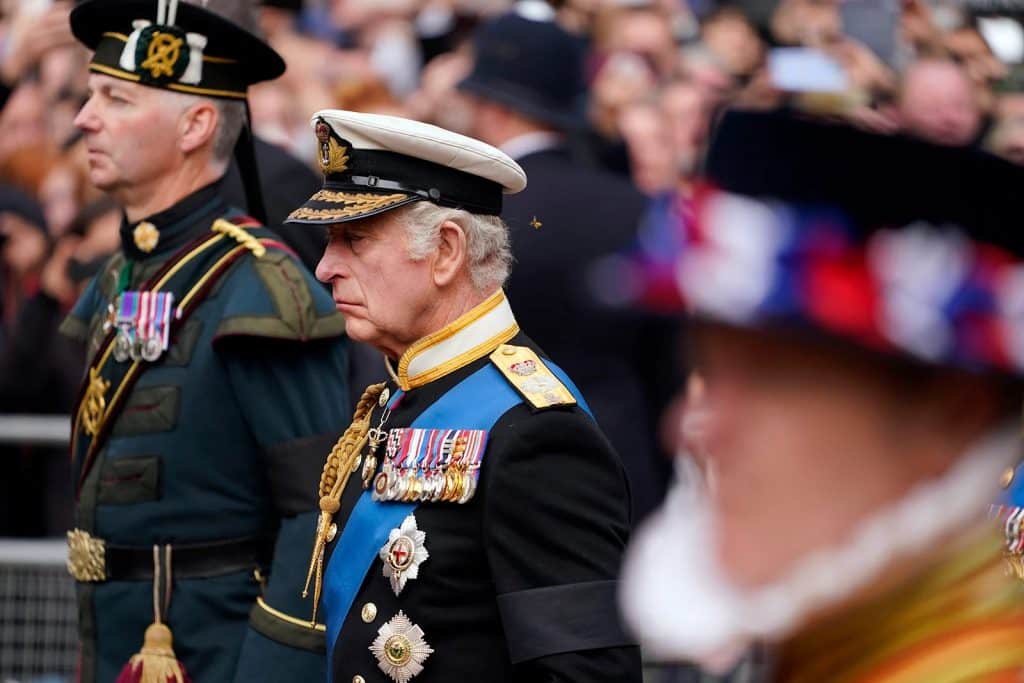
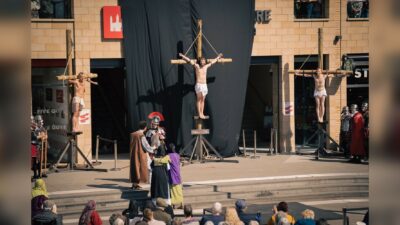

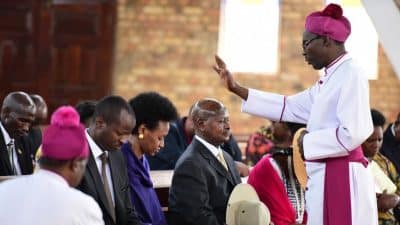

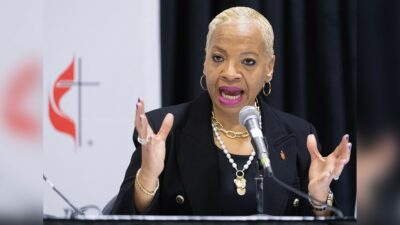










12 Responses
Only the last paragraph of Catherine’s analysis, makes sense to me as a Brit. An alliance between those of faith and the monarchy, while seeming to offer the protection of establishment power, appears to me to be intrinsically unstable and even untenable; orientated to a past rather than the present and a future. Faith should be speaking truth to power, rather than allying with it.
Curiously enough, the privileged position of Christianity (Catholic and Protestant) in the shaping of the next generation of British children as done nothing to halt the decline in religious belief in the UK.
33% of all state primary (grade) schools are “faith-based” and 20% of secondary (high) schools. I went to a faith-based school in Scotland (affiliated with the Church of Scotland) and attended over 2,000 daily “assemblies” (mini-services) in my time there, as well as a full church service once every term (semester). The Bible was a required textbook for Religious Education classes, though RE these days is less about teaching religious and more about teaching about religious beliefs.
If there was more than handful of classmates who were Christians by graduation, I would be shocked. Today there are more children in Church of England run state schools than there are people attending Church of England churches on Sunday mornings. It’s almost as though separation of church and state is actually a good idea…
That’s why I’m always amused when I hear American evangelicals demanding that Christianity — prayer, study of the Bible, etc. — should be returned to the public school system. Beware of unintended consequences. You too could be a truly post-Christian society like the UK in another generation or two. It doesn’t take very long.
Whenever I see talk of “all faiths” it reminds me of the ancient Greeks and Romans with their pantheon of gods.
The irony regards what Catherine’s piece lays out in terms of “all faiths”, is twofold. Firstly, the civic imperative as to toleration of all faiths, comes not from Church or Monarchy or the perspectives of “faiths”, but from what tends to be denigrated as the “secular”. Secondly, as the intolerance of critique of monarchy and Charles in recent days has demonstrated, there is little or no tolerance by the English establishment for faiths other than their own.
Regards the respective faiths of ancient Greece and Rome, just as with Christianity and the various faiths Catherine cites, the test is what kind of human being subscription to faith makes you. Faith, a crucial and central element in being human, is generically broader than religions which claim truth across it. Current faith in science and the material and the secular, pointing that up powerfully.
God and what that metaphor points to, is way greater and more ineffable than even the cited religions have collectively imagined. To look to Charles as the protector of that generic truth, is ridiculous beyond what words can express; claims to the contrary just the product of PR and myth-making machines.
Queen Elizabeth defended Prince Andrew after he was having visits with Jeffrey Epstein. I don’t consider that family Christian. Christians don’t try to cover up for groomers
She wouldn’t be the first, and she won’t be the last.
The Church of England started because King Henry VIII took advantage of the Protestant Reformation. He was not a religious man, but he couldn’t get the Pope to annul his longtime marraige to Catherine of Aragon for (ostensibly) failure to produce an heir. He wanted to marry Anne Boleyn, which he did. That marriage didn’t end well either. His “reforms” of his church were self-serving and only done to allow him to continue on as he pleased.
Now, 500 years later under very different circumstances, King Charles III is doing the very same thing. It’s a self-serving thing he’s doing within the church. It’s purely to allow the monarchy to continue rather than end. Period. 1 Timothy 3 talks about signs of the last days and the evils that will be practiced, including people being lovers of themselves and lovers of money, etc, with 1 Timothy 3:5 stating people “hav[ing] a form of godliness but denying its power. Have nothing to do with such people.”
I am no defender of the British monarchy (I would be happy for it to be abolished tomorrow), but in this instance, Charles is doing the right thing, and not for selfish reasons. His primary responsibility as king is to serve and defend the entire nation, not just members of the Church of England, and today that entails serving people of many faiths, and many people of no faith.
Comparisons with Henry VIII are simply ridiculous. Henry seized on an opportunity presented by the rising tide of Protestantism in England and used it for selfish purposes, plunging the country into bitter religious strife that lasted decades after his death.
Charles, on the other hand, is merely recognizing the reality of a secular, multi-faith Britain. The idea that he would suddenly pronounce that as “Defender of the Faith” he would exclusively defend the faith of the 1% of the population who still attend Church of England churches is beyond silly.
His future as king was assured either way. There is very little appetite for abolishing the monarchy and, if anything, blowing off other religious faiths would have strengthen his position with the ruling Conservative Party.
And what about the fact that the monarch may not marry someone who is of another faith? The Queen Consort or Prince must convert to the Church of England. That’s not very inclusive and again, is a protection of the institution itself from ooutside influences.
All of his nice proclamations amount to what the Brits call poppycock.
I don’t think most Brits care about such things one way or another these days. Those the know about the issue understand they’re an anachronistic hold over of a bygone age, much like all the other stuff surrounding the monarchy, especially the constitutional powers it theoretically holds (until it tries to use them, anyway).
Linda,
Think about what happened to King Solomon when he decided to marry women of varying faiths. It wasn’t pretty.
For God’s sake, let us sit upon the ground
And tell sad stories of the death of kings [Queens. Whatever.}
William Shakespeare
Richard II (1595) act 3, sc. 2